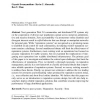Free Online Productivity Tools
i2Speak
i2Symbol
i2OCR
iTex2Img
iWeb2Print
iWeb2Shot
i2Type
iPdf2Split
iPdf2Merge
i2Bopomofo
i2Arabic
i2Style
i2Image
i2PDF
iLatex2Rtf
Sci2ools
138
click to vote
ECR
2010
2010
The design of a reliable reputation system
Next generation Web 2.0 communities and distributed P2P systems rely on the cooperation of diverse user populations spread across numerous administrative and security domains. Zero accountability via anonymous online identities and divergent interests result in selfish behavior that can disrupt or manipulate networks for personal gain. While "reputation systems" are recognized as a promising means to establish social control for such communities, developing reliable reputation systems remains a challenge. Several unaddressed threats still limit the effectiveness of reputation systems. Furthermore, most existing work on reputations has focused on accurate reputations for stable systems, but not examined the implications of integrating user reputations into scalable distributed infrastructures. The primary goal of this paper is to investigate and address the critical open challenges that limit the effectiveness of reputations. First, we identify a thorough taxonomy on reputatio...
Related Content
| Added | 10 Dec 2010 |
| Updated | 10 Dec 2010 |
| Type | Journal |
| Year | 2010 |
| Where | ECR |
| Authors | Gayatri Swamynathan, Kevin C. Almeroth, Ben Y. Zhao |
Comments (0)

